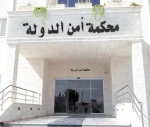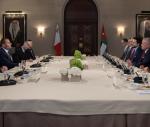You are here
MENA experts convene to advance local governance, decentralisation
By Ilham Darwazeh - May 19,2025 - Last updated at May 19,2025

Managing Director of Swedish Association of Local Authorities and Regions SALAR, Ryan Knox, concludes the second regional workshop of SALAR programme of the Inclusive Local Governance Programme in MENA Region (Photo Courtesy of Swedish Dialogue Institute for Middle East and North Africa)
AMMAN — Regional experts, civil society representatives, and international partners have recently convened at the Dead Sea to address how decentralisation and local development can shape more resilient and inclusive societies across MENA.
Organised by the Swedish Association of Local Authorities and Regions (SALAR), the event featured participation from experts and representatives of think tanks and civil society organisations from Algeria, Jordan, Morocco and Libya, alongside members of the diplomatic community and representatives from UN agencies, including the UNODC, ILO and UNDP.
The event marked the second regional workshop under SALAR’s Inclusive Local Governance Programme in the MENA region. It provided a platform for in-depth discussions on key issues such as empowering local governments, strengthening accountability, promoting gender balance, and enhancing community engagement.
Speaking at the closing ceremony, Director of the Swedish Dialogue Institute for the MENA Region Ann Mawe expressed hope that the gathering would serve as a launchpad for new partnerships and meaningful conversations.
“Ultimately, while conferences and formal meetings are important, it is often in informal settings, over a shared meal, in open conversation, where real partnerships are formed and genuine understanding begins,” she said.
Managing Director of SALAR Ryan Knox highlighted the organisation’s long-standing work in the region, saying, “We’ve worked in the Middle East and North Africa for nearly two decades. Since 2011, we’ve seen growing calls for citizen participation, more accountable governance and inclusive development”.
“Local government is where change is most likely to take root. We’re seeing new legislation and reforms across the region, from Iraq to Jordan to Algeria, that redefine the roles and responsibilities of local authorities.”
Knox also referenced Lebanon, noting that the newly formed government has signalled interest in reviving stalled local administration reforms that were last discussed in 2013. “This could be a crucial moment. Our goal is to ensure that reforms empower local governments to function effectively and be accountable to their citizens,” he added.
The event also included a training programme on decentralisation and inclusive local governance. Participants, grouped by country, presented initiatives aimed at strengthening local governance in their respective communities.
Nidal Neimat, a project manager at the Development Unit in Ayl Municipality, Maan Governorate, presented a community development project that resulted in the creation of two guides on community participation and urban planning.
“This two-year project is about sharing knowledge and experience. We now have over 650 members in a Facebook group dedicated to local development, and we aim to expand it into a broader 'community of practice' that can continue beyond the programme’s duration,” he said.















